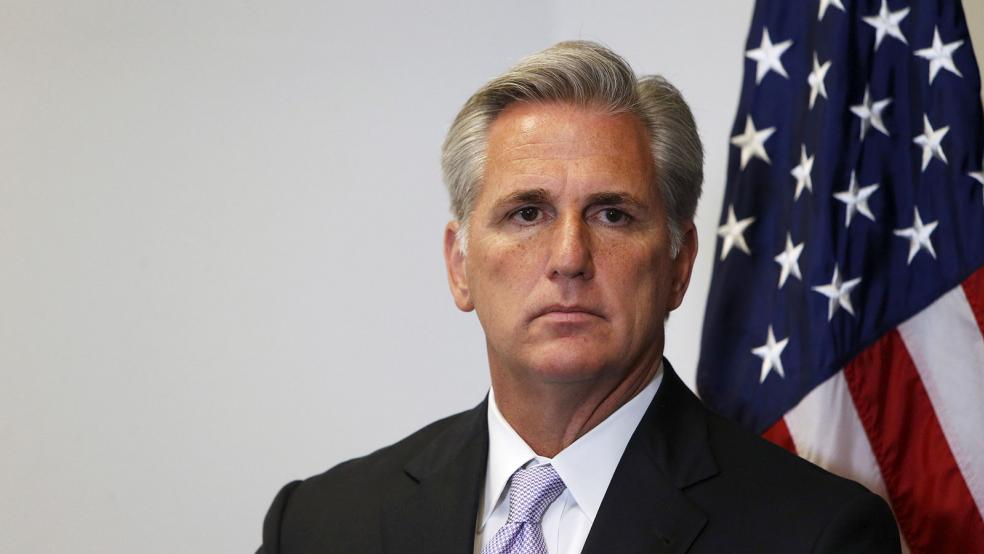Kevin McCarthy’s decision to abruptly withdraw from the race to become the next speaker of the House highlights the disruptive power of the anti-establishment fervor coursing through the Republican caucus. Members of the far right House Freedom Caucus weren’t satisfied with John Boehner’s resignation and objected vigorously to the idea of simply elevating the current No. 2 to take the speaker’s spot. McCarthy sealed his fate with his comment about Hillary Clinton and the political nature of the GOP Benghazi committee.
McCarthy, the House Majority Leader from California, got the message. “To unite, we probably need a fresh face,” he told reporters Thursday in explaining his decision to back out.
Related: With the House Divided, the Specter of a Year End Fiscal Disaster Looms
That’s a message that should worry former Florida governor Jeb Bush and, perhaps to a lesser extent, Sen. Marco Rubio of Florida. And to the extent that it suggests that the “throw the bums out” movement will continue to have sway in GOP races, it could be another unlikely gift from McCarthy to Hillary Clinton.
A similar anti-establishment fervor has turned the Republican race for the 2016 presidential race upside down, elevating Donald Trump, Dr. Ben Carson and Carly Fiorina to the top of the polls. Collectively, those three candidates — none of whom has ever held elected office — now have more than 50 percent of support in polls.
“The Republican Party really could be at a Federalist moment,” said pollster John Zogby. “You know, that moment when it just really breaks up.”
The rift is bound to be an obstacle for any candidate who wants to unify the warring factions, or at least draw enough support to win the White House. Zogby says the GOP is divided between at least three factions that are tearing the party apart — the establishment conservatives, the Freedom Coalition in the House and the Tea Party phenomenon outside, and the libertarian, Rand Paul types. “The splits in the party seem to be irreparable,” he said, “and there’s no indication … either in the primaries or in the House that there’s any glue.”
Related: Right-Wing Rebels Bring Down McCarthy, Another ‘Establishment Hack’
If Bush or Rubio was biding time, waiting for the party’s base to come to its senses, bring the big top down on the 15-ring circus and coalesce behind an electable establishment candidate…well, they may be waiting a long, long time. Just as McCarthy’s status as the party’s presumptive nominee — and the candidate with what seemed to be the easiest path to the 218 votes required to become Speaker — proved to be of little help, Bush’s pitch might not play, either.
“The only thing that could temporarily hold things together is the other side,” Zogby said. “If the Democrats nominate Hillary, for example, and give a whole different motivation to vote Republican.”
At least for now, the rebellion in the House will work to the advantage of those outsider presidential candidates, Zogby said, “For now, and in the short term, it certainly breathes more life into Trump, Carson and Fiorina.” The election is still 13 months away, though, and other variables could still come into play in unknown ways, Zogby cautioned. “You know, how long can Trump be outrageous? How long can Carson go kicking that can down the road without saying anything? And how long can Fiorina go with her biography?”
Over time, the conservative push for ideological purity — an emphasis on leaders who pass muster as “true conservatives” — could ultimately backfire against those outsider candidates, says Ross Baker, a political scientist at Rutgers University. “I think what you’re going to get is a kind of clinical examination of the record of these so-called outsider candidates and many of them are going to come up lacking,” he said. “Certainly Trump more than meets the standard for conservatives on illegal immigration but he fails on other counts or is suspect in other areas,” including abortion and single-payer health insurance.
Related: Boehner Resignation Increases the Prospects for a Government Shutdown
Even so, McCarthy's downfall and the rise of Trump, Carson and Fiorina may indicate what a broad swath of the Republican grassroots wants in their elected leaders: an anti-government candidate who promises to challenge, not just change, the political system. That’s a message Bush and Rubio, among others, will have to heed.
“I expect that the events of today will change the calculus for Bush and Rubio, making them more critical of the House leadership and broken Washington,” said Norman Ornstein, a congressional and political expert with the American Enterprise Institute. Ornstein added that if Boehner, who will stay on as speaker until a replacement is chosen, relies on Democratic votes to push through a budget deal and defuse a looming debt-ceiling crisis, it may help GOP presidential candidates — “but increase the populist backlash and likely the criticism by the candidates against their feckless leaders.”
One way or another, McCarthy’s decisions will have repercussions on the campaign trail.






